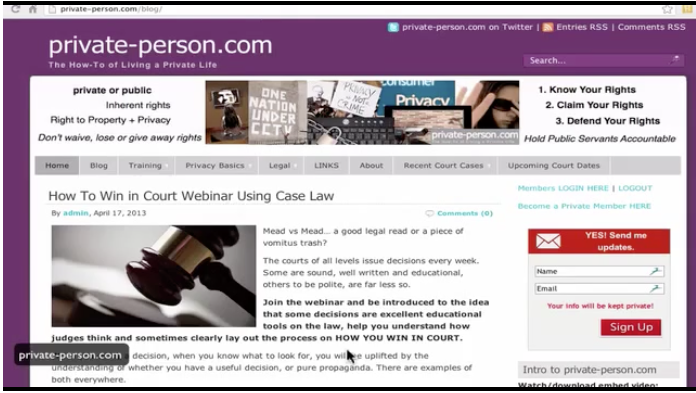Reading, Understanding and Using Court Decisions to WIN-Webinar

 Reading, Understanding and Using Court Decisions to WIN- Webinar
Reading, Understanding and Using Court Decisions to WIN- Webinar
Discover how to WIN in court.
If you are facing court as a plaintiff or a defendant then you need to understand how the game is played and the strategies you can use to win
Sure the game is “fixed”, you know that by now (although until you actually personally experience it you still hold out a feeble hope otherwise).
BUT every game has rules and processes and even in a corrupt game there are certain rules they play by because they have to. Those rules become your way to WIN.
Almost everything “they” do is – without jurisdiction – without standing – not specified in the Act they quote – errors in paper work – flawed in process – infringe your rights.
Real winning focuses not on the facts or evidence because without all of the above in place and proven legitimate then there is no case. NEVER deal with the facts until the above are properly established.
Make them prove, evidence and be accountable to all the key foundations of ANY case BEFORE a single fact is addressed. What are those foundations?
jurisdiction – standing – the Act they quote – proper paper work – proper process – respect for your rights – your status
One of the best places to find support and the EXACT way to address these foundations are in judicial decisions… how judges determine the outcome of a case and describe their legal analysis. Some decisions are crap and some are golden.
Learning how to find and read court decisions to get what you need to win is your guide to winning as a defendant, plaintiff or real party in interest.
Join the webinar tonight to explore a recent case and discover how to find the golden nuggets that will support you in your quest for justice from a system that does not really want to give it to you.
The members only webinar on Reading, Understanding and Using Court Decisions to WIN is visible below if you are signed into your free members account.
Free member access only webinar recording – Log In To Access
Become a Free Member to view this webinar recording – Enroll CLICK HERE
***** FREE MEMBER LEVEL ONLY CONTENT! You can sign up as Free Member to get access! *****
Valuable Videos
– Secrets Police Don’t Want You To Know


you have some good points there and I think mix a few from equity in…check out the new equity info on this site
Do you have a source quote for the 5 conditions?
The decisions of an inferior court are subject to collateral attack. , in a superior court one may sue an inferior court directly, rather than resort to appeal to an appellate court.
Decision of a court of record may not be appealed. It is binding on ALL other courts. However, no statutory or constitutional court (whether it be an appellate or supreme court) can second guess the judgment of a court of record. “The judgment of a court of record whose jurisdiction is final,
Summary proceeding. Any proceeding by which a controversy is settled, case disposed of, or trial conducted, in a prompt and simple manner,
without the aid of a jury, without presentment or indictment, or in other respects out of the regular course of the common law. In procedure,
proceedings are said to be summary ‘when they are short and simple in comparison with regular proceedings; e., in comparison with the
proceedings which alone would have been applicable, either in the same or analogous cases, if summary proceedings had not been available the orders made against me would be null and void in a common law or court standing as a private person .
To be a court of record a court must have four characteristics, and may have a fifth, they are:
1) “Judicial tribunal (Jury who sit on the King’s bench) having attributes and exercising functions independently of the person of the magistrate designated generally to hold it JD”
2) “Proceeding according to the course of common law ”
3) “Its acts and judicial proceedings are enrolled, or recorded, for a perpetual memory and testimony .”
4) Has power to fine or imprison for contempt .
5) Generally possesses a seal 6 . JD.
If you defend a summary claim your finished i have no standing as defendant With a counter claim i have a common law venue in a small claims action i have established standing